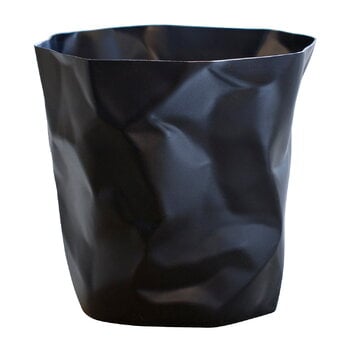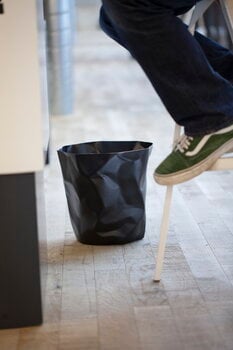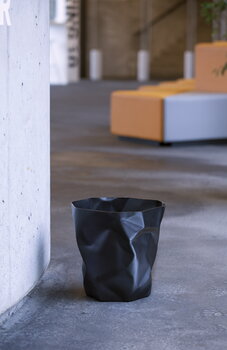Bin Bin is a delightful wastebasket designed by John Brauer for the Danish design company Essey. Bin Bin is a wastebasket with an identity all of its own. Bin Bin looks exactly like the contents it is designed to contain: crushed paper. Add a joyful touch to your study room, bathroom, children’s room, office, etc. thanks to this playful wastebasket. Bin Bin has received several prestigious design awards, such as the Good Design Award 2005 in Japan, the Red Dot Design Award 2007 for superior design quality and the IF-Product Design Award in Germany for outstanding design quality.
Bin Bin wastebasket, black
Essey
Description
Bin Bin is a delightful wastebasket designed by John Brauer for the Danish design company Essey. Bin Bin is a wastebasket with an identity all of its own. Bin Bin looks exactly like the contents it is designed to contain: crushed paper. Add a joyful touch to your study room, bathroom, children’s room, office, etc. thanks to this playful wastebasket. Bin Bin has received several prestigious design awards, such as the Good Design Award 2005 in Japan, the Red Dot Design Award 2007 for superior design quality and the IF-Product Design Award in Germany for outstanding design quality.
Product details (5)
- Material
- High-density polyethylene
- Colour
- Black
- Height
- 31 cm
- Diameter
- 33 cm
- Capacity
- 14 l
- Product ID
Designer
The Danish John Brauer (born 1960) travels around the world to get inspiration for his work from different cultures. Brauer has designed among other things the Bin Bin wastebasket for Essey, which won several renowned awards such as the Good Design Award 2005 in Japan, the Red Dot Design Award 2007 for superior design quality and the IF-Product Design Award in Germany for outstanding design quality.
View all productsReviews (1)
5
Based on 1 reviews
-
M
Mervi H
Täydellinen, sopii upeasti teini-ikäisen pojan uudistettuun huoneeseen.
269 days ago
Sustainability
The Product Sustainability Framework, our criteria of sustainable design, helps you find the most sustainable products in our selection. Read below which sustainability criteria this product has met.
Working conditions & labour 9/9
-
Equal opportunities for all employees
-
Commitment to UN Global Compact, fair compensation for all employees
-
Corporate responsibility requirements defined and communicated for suppliers
-
Systematic work for improved inclusion and well-being in the workplace
-
Transparent supply chain
-
Suppliers' compliance to a code of conduct ensured
-
Direct suppliers audited and certified
-
Compliance to the UN Guiding Principles on Business and Human Rights ensured in the supply chain
-
Support for community involvement in the supply chain
Eco-friendly production 7/9
-
Fair and resource-wise water-use in production
-
No incineration or landfilling of returned items
-
No use of endangered species as materials
-
No direct environmental emissions or waste (excl. GHGs) from production
-
The sustainability of direct suppliers' production is addressed and monitored
-
Material-efficient and ecological packaging
-
No potentially harmful chemicals used in own production
-
Production and material sourcing that respect biodiversity, animal rights, and natural ecosystems
-
Positive impact on nature’s well-being through operations that regenerate natural ecosystems
Climate impact 5/8
-
Company's direct greenhouse gas emissions identified and commitment to reduction
-
Product's carbon impact identified and commitment to reduction
-
Guidance on energy- and eco-efficient use of the product
-
Contribution to climate initiatives beyond the brand’s direct operations
-
Low-carbon or compensated transportation
-
Carbon footprint of the product calculated and goals set to reduce it
-
100 % renewable energy in own production and operations
-
Carbon neutral or carbon negative product
Sustainable materials 6/6
-
Sustainable and long-lasting material choices
-
No harmful or hazardous substances
-
Responsible raw material sourcing and production
-
Materials suited for circularity: monomaterials, recyclable finishings, renewable or recycled contents etc.
-
Ecological materials: natural, biodegradable, recyclable or recycled contents
-
Outstanding materials in terms of innovativeness, responsibility, sustainability and circularity: local production or sourcing, 100 % recycled content, C2C-certification etc.
Circular design 5/5
-
High aesthetic quality promoting long-term use of the product
-
Technically durable product design and material choices
-
Design for enduring life-long quality
-
Design and support for product maintenance, repair and upgradability
-
Innovative circular design solutions: circular service system, resale platform, remanufacturing, collection of used products, etc.









